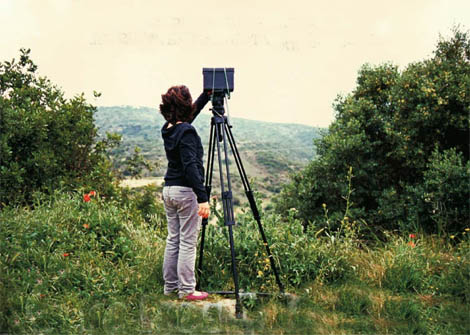 Promoting a relationship of identity with the cultural landscape and enhancing artistic and heritage education among young people and children from Algarve host institutions are the objectives of the «Magic Places – the Algarve landscape» project, whose second edition is running from February to November , in an initiative of the Regional Directorate of Culture of the Algarve in partnership with the Associação Atelier Educativo and the support of FNAC Algarveshopping.
Promoting a relationship of identity with the cultural landscape and enhancing artistic and heritage education among young people and children from Algarve host institutions are the objectives of the «Magic Places – the Algarve landscape» project, whose second edition is running from February to November , in an initiative of the Regional Directorate of Culture of the Algarve in partnership with the Associação Atelier Educativo and the support of FNAC Algarveshopping.
This project was started in 2010, as part of the European Year of Poverty and Social Exclusion, and is based on the promotion of a direct relationship between artists/creators and children of different ages and origins, from the experience of unique places of cultural heritage and natural from the Algarve.
«Thinking, creating and recording/building the territory are the objectives of “Magic Places”, a project that is based on the belief that we can be transformed through the relationship with others and with the place. Keeping the concept of living, practicing and feeling culture, this second phase of the project will focus on exploring the richness and diversity of the Algarve's cultural landscape», explains the Regional Directorate of Culture.
«What if one day schools became a “kind” of academies, with drawing, painting, dance, theater, cinema ateliers?... And what if these academies valued the arts, mathematics and Portuguese in the same way?... Children certainly became happier adults», stresses Tânia Nunes, from Associação Atelier Educativo.
This is precisely one of the starting points of the project «Magic Places – the Algarve landscape» and, to give it body, this year five workshops will be held in the areas of drawing, painting, photography and dance, with the participation of around 70 children and young people from across the region.
The first drawing and painting workshop, called «A Linha do Guadiana», is coordinated by Pedro Leitão, and is taking place in February and March, with young people from the Gente Pequena Reception Center in Vila Real de Santo Antonio.
Will be visited the Farol of Vila Real de Santo António, the Museum of Warriors in Rio, and the Castle of Castro Marim.
Another studio, in photography, has the theme “The millenary construction of the landscape”, being coordinated by the photographer Vasco Célio. It will take place in April and May, with young people from the Bom Samaritano institution, based in Portimão. The exploration themes will be the Castle of Alvor, the Castle of Paderne, the Walls of Portimão, the Menhir dos Gregórios, the Quinta de Marim (Chalet João Lúcio) and the Castle/Walls of Faro and Ria Formosa.
There will also be another workshop with the same theme, in October and November, this time with the participation of the young women from the Casa de Protección das Meninas de Faro , on Sundays, and with the youngsters of Santa Casa da Misericórdia in Albufeira Lar Gaivota, on Saturdays, in this case with the theme of exploration of the Castle of Paderne.
«The lines of our landscape» is the theme of the dance studio, directed by choreographer and dancer Maria Alcobia, which will take place in May and June, with young people from the Lucinda Animo dos Santos Social Assistance Center, in Lagos. The Chapel of Nossa Senhora de Guadalupe, in Vila do Bispo, will be the pretext for this studio.
A utopia or maybe not
«Unfortunately, most public schools and private colleges overvalue school performance, based mainly on the assessment of Portuguese and mathematics subjects. In other words, those who are not good at these subjects will always be stigmatized and will possibly feel inferior in relation to those who manage to obtain average or satisfactory results. An injustice. They may love dancing, singing, drawing, photographing, doing sports, and doing it well, but as these areas are in the background, individual and collective recognition is not done», stresses Tânia Nunes, from Associação Atelier Educativo, partner and motor of “Magic Places” project.
"Education as I see it, should be integrative, accepting the differences, motivations and interests of each one, and participatory, in the sense of being open to Knowledge", he adds.
Tânia Nunes admits that all this could be a utopia, but argues that “schools should incessantly promote access to culture, good cinema, visits to exhibitions, operas, dance performances, museums, monuments, properly framed experiences, they should be more part of school life”.
For her part, Dália Paulo, regional director of Culture, considers that “culture should not assert itself. It must be lived, practiced and felt».
The official adds that «it was with this constructive spirit that the Regional Directorate of Culture of the Algarve challenged the Atelier Educativo to design an Artistic Education project, as part of the European Year for Combating Poverty and Social Exclusion; in this way the Magical Places were born”, which this year happens again.
«Based on our Cultural Landscape, Magical Places was designed by combining, from the outset, the built heritage (monuments) and artistic creation in a common objective: to enhance looks, dialogues and experiences for the target audience, in a full exercise of citizenship», he also explains Dahlia Paul.
"This project is also based on the openness and receptivity of civil society and the institutions that welcomed and shaped it, giving it the necessary breath to make it an opportunity to make a difference in the lives of its users", adds the regional director, stressing that workshop users are “very special people who, with the sparkle in their eyes, the contagious joy, the pride in know-how and in creating, give us strength and encouragement to continue”.
O Sul Informação is media partner of this project «Magic Places».
















Comments